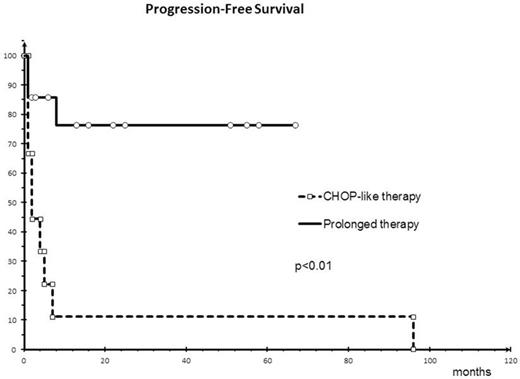Abstract
Introduction: Angioimmunoblastic T-cell lymphoma (AITL) is a rare tumor derived from follicular T-helper and characterized by low response rate and relapsing course to standard therapy. CHOP-like therapy shows 70-80 % of overall response rate, though 2-year progression-free survival is observed only in 30-40 % of patients. Unsatisfactory results of treatment angioimmunoblastic T-cell lymphoma by ÑÍÎÐ-like therapy require searching new approaches to therapy.
Aim: To define a rational approach to treatment of angioimmunoblastic T-cell lymphoma.
Patients and methods: Ñlinical outcomes of 23 patients with newly diagnosed AITL treated between June 2002 and July 2015 we retrospectively analyzed. The diagnosis was verified according to WHO classification.
Results: Among the 23 patients 14 men and 9 women were included with a median age of 63 (range, 29-81). Twenty-two of 23 patients had Ann Arbor stage IV. Bone marrow involvement was detected in 21 of 23 cases by histological investigation. Nine of 23 patients received CHOP-like therapy; other 14 patients were treated prolonged therapy. Eight (89%) of 9 patients after CHOP-like therapy had treatment failure. Time to disease progression ranged from 1 to 7 months (median 3). Fourteen of 23 patients were treated by prolonged therapy consisting of low dose cytotoxic drugs weekly and supporting the therapy by interferon-A and thalidomide. Supporting therapy has administrated after achieving complete remission and was continued in 2 years. Prolonged therapy wasn't finished in 3 patients with severe infections and somatic pathology. Eleven (79%) of 14 patients treated by prolonged therapy achieved complete remission, treatment was finished only in 5 of 11 patients; follow-up varies from 3 to 67 months, a median 29. Univariate analysis of progression-free survival curves showed that prolonged therapy is more effective than CHOP-like therapy (p < 0.01) (Fig.1). Prolonged therapy was performed in 4 of 8 patients with progression disease after CHOP-like therapy; 2 patients achieved a complete remission, continuing 41 and 77 months.
Conclusion: Although, this was a small retrospective study, the results show that efficiency of prolonged therapy is better than CHOP-like therapy in patients withangioimmunoblastic T-cell lymphoma. Prolonged therapy allows preventing early treatment failures.
No relevant conflicts of interest to declare.
Author notes
Asterisk with author names denotes non-ASH members.


This feature is available to Subscribers Only
Sign In or Create an Account Close Modal